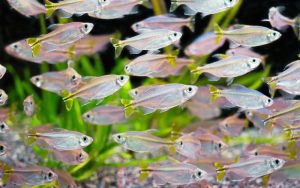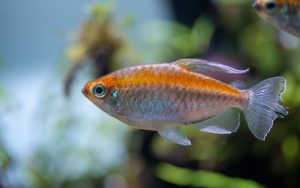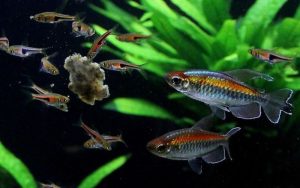Guppies are one of the most popular freshwater fish for aquarium enthusiasts, known for their vibrant colors and playful nature. But if you’re setting up guppy tank, you might wonder: Do guppies like current in their tank?
This question is more important than you might think, as creating the right environment can significantly impact their happiness and health. Whether you’re a seasoned aquarist or a beginner, understanding how guppies interact with water currents can help you design the perfect guppy fish tank setup.
As someone who has kept guppies for years, I’ve observed firsthand that they absolutely enjoy swimming in and out of currents.
It’s a delightful sight to see them darting through the water with energy and grace. They seem to treat currents as both a playground and a challenge, which keeps them active and entertained.
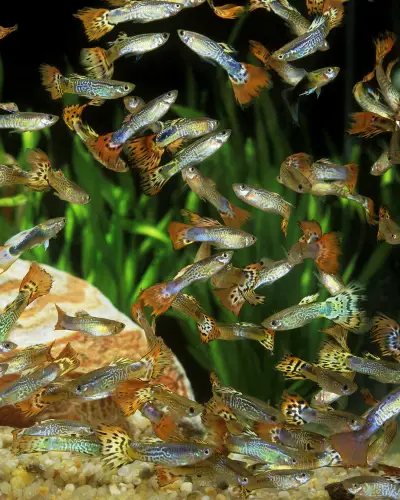
Do guppies like flow? It is crucial to create a tank environment that mimics their natural habitat, including water currents. In this article, we’ll explore why guppies prefer current in their tanks and its benefits.
However, balance is key—gentle currents are ideal, as strong ones might tire them out. Read on to discover how to strike the perfect balance in your tank, ensuring your guppies thrive in a current-friendly environment!
Table of Contents
ToggleDo Guppies Like Current?
Do guppies like high current? Like many other fish species, guppies prefer living in bodies of water with a moderate current. They often exhibit a natural affinity towards currents, providing them with a source of exercise and fun.
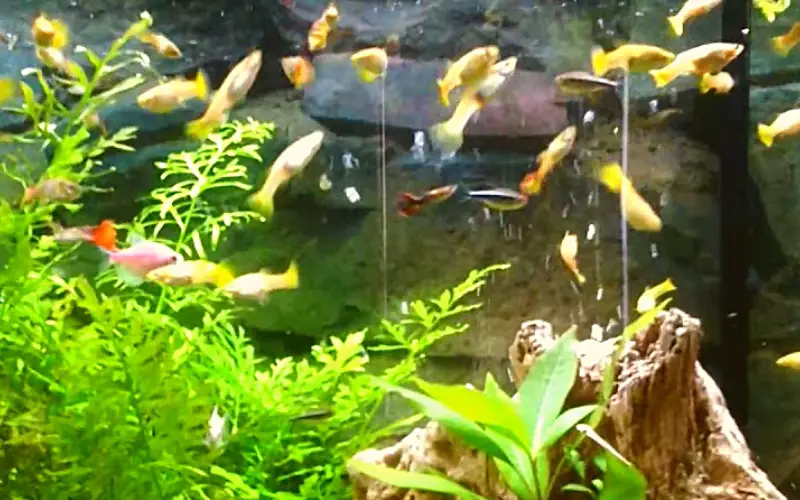
So, do guppies like fast flowing water? Guppies thrive in environments where the water is gently flowing, creating a gentle current that allows them to swim and explore. On the other hand, guppies do not like strong water currents, which can cause them stress and fatigue.
Therefore, it is essential to strike a balance when setting up an aquarium or a guppy tank. A moderate water current will ensure the guppies’ well-being and keep them content in their environment.
The Natural Habitat of Guppies
Let’s first explore their natural habitat to understand guppies’ preference for current. Guppies inhabit rivers, streams, and ponds with varying degrees of water flow for guppies in the wild.
These environments are characterized by gentle to moderate currents, which play a vital role in the guppies’ overall health and survival. Guppies have adapted to life in these conditions, and replicating a similar environment in your aquarium can positively affect their well-being.
Guppies and Water Current: A Perfect Match
It’s no secret that guppies and water currents go hand in hand. Guppies are highly active fish that like to explore their surroundings and engage in playful behavior. The presence of a gentle current in their aquarium provides them with the perfect playground to exhibit their instincts.
Guppies enjoy swimming against the current, chasing food particles, and playing games with their fellow tank mates. The flowing water creates a dynamic and stimulating environment, which is essential for their physical and mental stimulation.
The 5 Benefits of Current for Guppies
– Physical Fitness and Exercise
Guppies are known for their agility and graceful swimming abilities. The current presence in their tank encourages regular exercise, promoting their physical fitness. Swimming against the current provides resistance, similar to human exercise routines. This constant movement helps strengthen their muscles and improves their overall stamina. Guppies with regular access to current are less prone to obesity and related health issues.
– Reproduction and Breeding
Water current plays a crucial role in the reproductive success of guppies. Female guppies, known as “sows,” give birth to live fry instead of laying eggs. The current presence facilitates the dispersion of newborn fry throughout the tank, preventing overcrowding and reducing predation risk.
The current also assists in distributing pheromones released by female guppies, attracting male guppies and promoting successful breeding.
– Oxygenation and Water Quality
Water current aids in oxygenation and ensures proper water circulation within the aquarium. Guppies need well-oxygenated water to thrive, and the gentle flow enhances the exchange of gases at the water’s surface. Moreover, the movement of water helps prevent stagnant areas and promotes the removal of debris, ensuring a cleaner and healthier environment for the guppies.
– Stimulation and Enrichment
Guppies are intelligent and curious fish that thrive in an enriched environment. Current presence stimulates their senses and prevents boredom, reducing the likelihood of stress-related behaviors. The flowing water provides new challenges and opportunities for exploration, keeping the guppies mentally engaged and satisfied.
– Behavioral and Natural Instincts
In the wild, guppies rely on their instincts to navigate through water currents and survive. By recreating a similar environment in their aquarium, we allow guppies to express their natural behaviors. Current presence encourages the development of their natural instincts, making them feel more at home and ensuring their overall well-being.
Signs of Excessive Current and How to Manage It
While guppies enjoy current, it’s essential to strike a balance and avoid creating a too-strong current. Signs of excessive current include constant swimming against the flow, struggling to maintain position and visible signs of stress.
If you observe these signs, it’s crucial to reduce the current to prevent exhaustion and potential health problems. You can achieve this by adjusting the flow rate of your aquarium filter, redirecting the guppy water flow, or introducing plants and decorations that act as barriers and break up the current.
What Can Cause Current in a Fish Tank?
Current in a fish tank can be caused by a variety of factors. One common factor is the use of a filter in the tank. The filter helps to circulate and clean the water, creating a current in the process.
While current is beneficial for the fish, ensuring the current is not too strong is essential, especially for small and delicate fish like guppies. If the current in your tank is too strong, guppies may struggle to swim against it, and guppies will get exhausted.
In extreme cases, they may even get swept away by the current. Therefore, choosing a filter with adjustable settings or adding obstacles to the tank is essential to reduce the guppies water flow when necessary. Guppies and other active fish can thrive and remain healthy in their aquatic environment by maintaining a suitable current.
How Much Current Should Guppies Have?
Guppies are tropical freshwater fish that prefer calm and slow moving water. They are not strong swimmers and only require a slight current in their aquarium.
Excessive guppy water flow can stress them out and make swimming challenging. Ideally, the water flow in a guppy tank should be gentle and minimal.
A low-flow or sponge filter is usually sufficient for adequate filtration without creating too much current. Avoiding strong powerheads or high-flow filters that can create strong currents in the tank is crucial.
If you notice your guppies struggling to swim against the current or constantly hiding in areas with less water flow, it may be a sign that the wind is too strong for them.
In such cases, try adjusting the flow rate of your filter or adding decorations and plants to create barriers that help break up the current. Providing your guppies with a calm, stress-free environment is crucial for their health and well-being.
Ensuring a suitable water flow for guppies can help it thrive and enjoy their aquarium habitat.
What Happens To Guppies If The Current Is Strong?
If the current in a guppy tank is too strong, it can adversely affect the fish. Here are some potential consequences:
1. Stress: Guppies are not strong swimmers, and excessive water flow can cause stress. They may struggle to swim against the current, leading to exhaustion and increased stress levels. This might weaken their immune system and make them more susceptible to diseases.
2. Difficulty feeding: Strong currents can make it challenging for guppies to reach their food. The food may get swept away before they can eat, resulting in malnutrition and poor growth.
3. Injuries: Guppies may get injured by being pushed into sharp objects or decorations in the tank due to the force of the current. Their delicate and long fins and bodies can be damaged, leading to open wounds or fin rot.
4. Breeding difficulties: Guppies are prolific breeders, but strong currents can disrupt their breeding behavior. The current may scatter the fry (baby guppies) away from their hiding places or make it difficult for the male to fertilize the female’s eggs successfully.
5. Behavioral changes: Guppies may exhibit abnormal behavior in response to strong currents. They may become more reclusive, hiding in areas with less water flow or constantly swimming against the wind, which can exhaust them.
Ensuring that the water flow in a guppy tank is gentle and suitable for their needs is essential to prevent these issues. Adjusting the filter’s flow rate or adding decorations and plants to break up the current can help create a more comfortable tank environment for your guppies.
Observing and monitoring their behavior will also help you determine if the current is too strong and needs adjustment.
How To Reduce The Current In An Aquarium?
Reducing the current in an aquarium can be essential for the health and well-being of your fish. Here are some practical ways to reduce the current in your aquarium:
- Adjust your filter: Reduce the flow rate of your filter by adjusting the settings or installing a flow reducer.
- Use a pre-filter sponge: Attach a pre-filter sponge to your filter intake to reduce the flow rate and disperse the current.
- Add decor: Adding plants, rocks, or other decor to your aquarium can help break up the guppies water flow and reduce the current.
- Change the direction of your filter output: Adjust the direction of your filter output to aim towards the glass wall or substrate to reduce the current.
- Use a baffle: Install a baffle or flow diverter to reduce the flow rate and break up the current.
It’s important to monitor the water quality and ensure that the reduced current is not impacting the filtration and aeration of your aquarium. With these tips, you can quickly reduce the air pump current in your aquarium and provide a comfortable environment for your fish.
FAQs (Commonly Asked Questions)
Do guppies like strong currents?
Do guppies like a strong current? Yes, guppies enjoy gentle to moderate currents. Strong currents can be detrimental to their well-being and should be avoided.
Can guppies survive in slow-moving water?
Guppies are adaptable fish and can survive in slow-moving or still water. However, providing a gentle current is more beneficial for their overall health.
How can I tell if the current in my aquarium is too strong?
If your guppies constantly struggle to swim against the current, show signs of stress, or exhibit erratic behavior, it indicates that the current is too strong.
What can I do to reduce the water flow in my tank?
To reduce the water flow, you can adjust the flow rate of your aquarium filter, use baffles or barriers, or introduce plants and decorations that break up the current.
What is the natural habitat of guppies?
Guppies are native to South America and are found in rivers, streams, and ponds with varying degrees of water flow.
Do guppies like a current in their tank?
Do fancy guppies like current? Yes, guppies fish like current in their tank.
Why do guppies like strong currents?
Why do guppies like fast current? Guppy fish like strong current because it mimics their natural habitat in the wild, where guppies live in fast-moving water.
Are there any benefits of having a strong water current in a guppy tank?
A strong water current benefits guppies as it helps oxygenate the water and keep it clean.
Do guppies like to play in the current?
Do guppies like water flow? Yes, Swordtails and guppies like to play in the current. They enjoy swimming against the flow and exploring their environment.
Can guppies survive in a tank without any current?
Yes, guppies can survive in a tank without any current, but they may not thrive as much as in a tank with a gentle current.
What are the signs of too much current in a guppy tank?
Signs of too much current in a guppy tank include stressed fish, fish struggling to swim against the current, and fish being pushed to the water’s surface.
Will guppies get exhausted if the current in their tank is too strong?
Guppies are small fish that will get exhausted if the current in their tank is too strong. They cannot swim against a strong current for a prolonged period.
Do fancy guppies like to play in current?
Do you fancy guppies like current? Yes, fancy guppies, like other guppies, enjoy playing in the current.
How does the current in a guppy tank affect the fish?
How does the current affects guppies? The current in a guppy tank affects the fish by providing exercise, stimulation, and mimicking their natural environment. However, too much current can also stress the fish.
How can I tell if the current in my aquarium is too strong for my guppies?
You can tell if the current in your aquarium is too strong for your guppies if they show signs of stress, struggle to swim against it, or constantly seek shelter from the flow.
Do guppies like high flow?
Do guppies like flowing water? Guppies can handle moderate water flow. In the wild, they live in streams. But very strong currents can exhaust them. If your filter creates a strong current, add plants or adjust the filter output for calmer areas.
Do guppies like fast moving water?
Do guppies like moving water? Guppies enjoy gentle water flow, mimicking their natural habitat. Very strong currents can tire them out. Provide areas of calmer water for resting and fry.
Can guppy swimming against filter current?
Yes, guppies can swim against filter currents. They may enjoy the exercise or be carried by the current and then swim back.
What do guppies like to play with?
Guppies don’t play with toys like most pets. They enjoy exploring a tank with hiding spots and chasing live food.
Do guppies like still water?
No, guppies don’t prefer still water. In nature, they live in flowing streams. While a gentle current is ideal, a calm area in the tank is also important for resting.
Do guppies need air bubbles?
Do guppies need a bubbler? Guppies don’t necessarily need air bubbles (airstones). However, bubblers promote good water oxygen levels and circulation, benefitting guppy health.
Why do guppies swimming against current?
Guppies swim against current to maintain their position, strengthen muscles, and improve endurance. This behavior also mimics their natural habitat, where they encounter flowing water.
What do guppies like in their tank?
Guppies like a well-planted tank with hiding spots, warm water (around 75-82°F), good filtration, and a varied diet including flakes, live, or frozen foods for optimal health and happiness.
Conclusion
So, do guppies like current? In conclusion, guppies indeed like the current in their aquarium. The presence of gentle current offers numerous benefits to their physical health, mental stimulation, and overall well-being. By replicating their natural habitat and providing a dynamic environment, we can create an ideal setting for guppies to thrive. However, it’s essential to monitor the current’s strength and make adjustments to ensure it remains within a comfortable range for the guppies. So, if you’re considering adding guppies to your aquarium, remember to include a suitable guppy water flow to make them feel right at home.
You might also like
- Lyretail Guppies 101: Some Excellent Tips You Can’t-Miss!
- How Big Does Guppies Get: A Comprehensive (Beginner’s Guide)
- What Temperature Do Guppies Need: 5 Tips for Optimal Growth
- How to Breed Guppies for Color? (A Comprehensive Guide)
- Do Guppies Need a Filter in Their Tank: 3 Key Benefits of Using a Filter!
- What Can Guppy Fry Eat: 5 Nutritional Foods for Rapid Growth!
- How Long Guppies Live Without Food: (Solved & Explained)
- Constipation in Guppies: Symptoms, Causes & Best Treatment!
- Does Guppy Fish Need Air Pump: The ANSWER Will SHOCK You!
- Can a Guppy Live Without a Filter: Here’s How to SAVE Them!
- Raising Guppies in Backyard Pond: A Comprehensive Beginner’s Guide!


